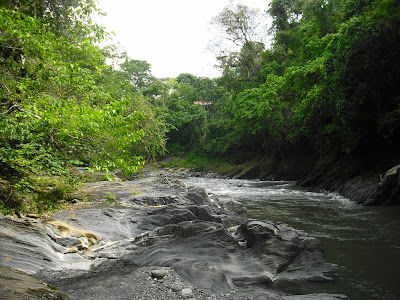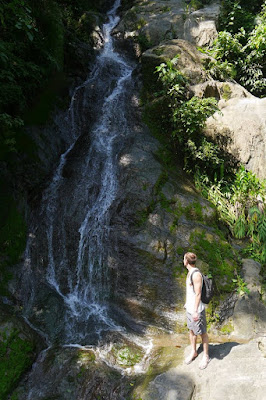Bogotá, as much as any big smoke (if not a little bit more than some) can get exhausting after a while. It's generally a good idea to get away from it all on a regular basis.
Now, considering I was out of it, and the country, for a whole five weeks recently, that I was happy to leave the city virtually as soon as I got back may not seem like I was completely at ease with my return.
There might be a half truth to that, but seeing how I was effectively homeless on my return plus the fact there was no immediate rush to get back to my, um, work here, taking the opportunity to check out a new, hotter and much quieter location didn't take much persuading.
And as has been detailed on this blog before, these type of more alluring places are dotted all around Bogotá. You don't need to travel far to escape the metropolis' madness.
This time around the venue was the small settlement of Tobia, tucked away at 800 metres above sea level off the main road between the towns of La Vega and Villeta, both of which I already explored earlier this year.
Tobia has been building itself up as an adventure sports/tourism destination for the last number of years now; a place to rival the more well-known San Gil.
Now, considering I was out of it, and the country, for a whole five weeks recently, that I was happy to leave the city virtually as soon as I got back may not seem like I was completely at ease with my return.
 |
| Río Negro, Black River, Tobia. |
And as has been detailed on this blog before, these type of more alluring places are dotted all around Bogotá. You don't need to travel far to escape the metropolis' madness.
This time around the venue was the small settlement of Tobia, tucked away at 800 metres above sea level off the main road between the towns of La Vega and Villeta, both of which I already explored earlier this year.
 |
| Downtown Tobia. |
Tobia has been building itself up as an adventure sports/tourism destination for the last number of years now; a place to rival the more well-known San Gil.
However, for both foreign and native holiday makers alike, it's not exactly the first place on the must-see list. In fact, you'll meet plenty of Bogotá locals who don't even know it exists, even though it's just a 90-minute drive north-west from the capital.
Nonetheless, from what I discovered during my midweek stay there, you'll do well to find as laid-back, tropical a setting, as this so close to Bogotá, with plenty of things to keep you active.
It offers pretty much all that the far popular San Gil does in terms of extreme sports — minus the steady stream of backpackers and associated hostels.
Nonetheless, from what I discovered during my midweek stay there, you'll do well to find as laid-back, tropical a setting, as this so close to Bogotá, with plenty of things to keep you active.
It offers pretty much all that the far popular San Gil does in terms of extreme sports — minus the steady stream of backpackers and associated hostels.
Alongside rafting, kayaking, rock climbing/descending and the like, it has, so the locals say, the second highest zip line/canopy in all of Latin America. Whether it is or not, at over 200 metres above the village and the river it straddles, the Río Negro, gliding over in two separate lines at speeds of up to 40 mph, the canopy certainly has a James Bond feel to it. The views, if you're not too spooked, aren't half bad either.
For the more budget-conscious visitor or for those just not that bothered to do any of the paid activities, taking in the nature and vistas with a walk along the banks of the Río Negro, where its waters, in some spots, provide a refreshing dip from the heat, is well worth it.
The village itself, midweek in any case, is as peaceful as you're likely to find. The Colombian standard of belting out vallenato or ranchero music to eardrum-breaking levels at any time of the day, even in the middle of nowhere, doesn't seem to exist.
For the more budget-conscious visitor or for those just not that bothered to do any of the paid activities, taking in the nature and vistas with a walk along the banks of the Río Negro, where its waters, in some spots, provide a refreshing dip from the heat, is well worth it.
 |
| Tobia's natural delights. |
Indeed, at times it looks like there are more dogs than people, and those humans who are present tend to leave you to your own devices, apart from a few inquisitive, yet pleasant, children.
There are a number of accommodation options, with what appear like the more 'upmarket' ones located a short walk outside the village itself. My Dutch companion and I landed ourselves what must be the best spot in the actual village, Hotel San Pedro, for a very reasonable price.
There are a number of accommodation options, with what appear like the more 'upmarket' ones located a short walk outside the village itself. My Dutch companion and I landed ourselves what must be the best spot in the actual village, Hotel San Pedro, for a very reasonable price.
We had the place and its swimming pool to ourselves for the three nights we stayed, save for the sporadic interruptions of day trippers from Bogotá who breakfasted and lunched there.
From what we could gather, this is the weekday norm; day-trip visitors with very few outsiders overnighting it. It can be a different story at weekends, especially holiday ones.
That midweek tranquillity might change a little in the coming years. For when it comes to a quick overland escape from Bogotá, the message is slowly getting out that 'It's got to be Tobia.'
_____________________________
Facebook: Wrong Way Corrigan - The Blog & IQuiz "The Bogotá Pub Quiz".
From what we could gather, this is the weekday norm; day-trip visitors with very few outsiders overnighting it. It can be a different story at weekends, especially holiday ones.
That midweek tranquillity might change a little in the coming years. For when it comes to a quick overland escape from Bogotá, the message is slowly getting out that 'It's got to be Tobia.'
_____________________________
Facebook: Wrong Way Corrigan - The Blog & IQuiz "The Bogotá Pub Quiz".










